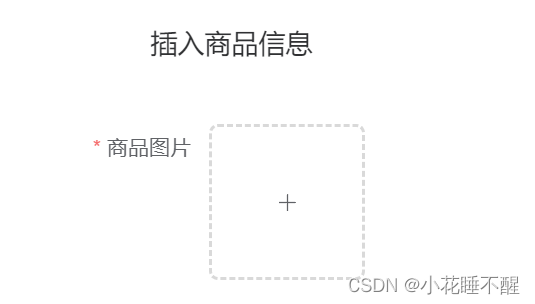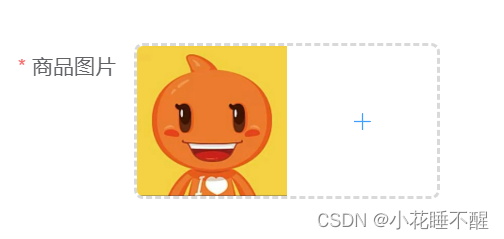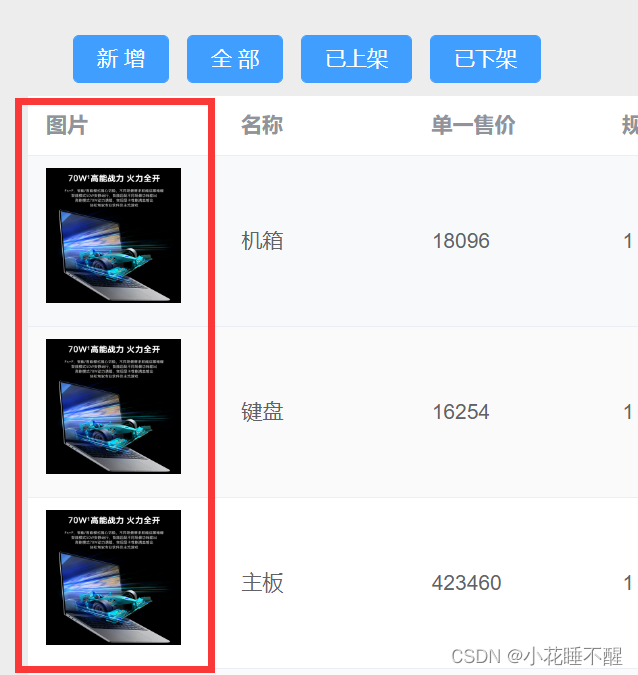效果图如下:
实现:
首先使用UI组件进行上传,前端代码如下:
<template>
<div>
<el-form :inline="true" :model="form" :rules="rules" ref="form" label-width="90px" >
<el-form-item label="商品图片" prop="goodsImage" :required="true" style="text-align:left;">
<el-upload
class="avatar-uploader"
action="http://localhost:8088/users/uploadImg"
:show-file-list="false"
:on-success="handleAvatarSuccess"
:before-upload="beforeAvatarUpload">
<img v-if="imageUrl" :src="imageUrl" style="width: 100px; height: 100px" class="avatar">
<i v-else class="el-icon-plus avatar-uploader-icon"></i>
<el-icon style="width: 100px; height: 100px" class="avatar-uploader-icon"><Plus /></el-icon>
</el-upload>
</el-form-item>
</el-form>
</div>
</template>
<script >
import {ref, reactive, defineComponent, computed} from "vue";
import { ElMessage } from 'element-plus'
import {personReq} from "@/api/request";
import { Plus } from '@element-plus/icons-vue'
export default {
data() {
return {
imageUrl:'',
formData:{
goodsImage:''
}
}
},
methods: {
handleAvatarSuccess(res, file) {
console.log(file)
console.log(res)
this.imageUrl = URL.createObjectURL(file.raw);
imageUrl.value = res.message
this.formData.goodsImage = res.message;
},
beforeAvatarUpload(file) { // 上传前的方法,限制上传的大小,还有格式
const isLt2M = file.size / 1024 / 1024 < 2;
if (!isLt2M) {
this.$message.error('图片大小不能超过2MB!')
return false
} else if (file.type !== 'image/jpg' && file.type !== 'image/png') {
ElMessage.error('请选择图片类型的文件!')
return false
}
return true
}
}
}
</script>
因为我的项目采用前后端分离模式,后端使用 springboot 接收以后的上传代码:
@PostMapping("/uploadImg")
public JsonResult<String> uploadFile(@RequestParam("file") MultipartFile file, Model model){
String fileName = file.getOriginalFilename();
System.out.println("111"+fileName);
String suffixName = fileName.substring(fileName.lastIndexOf(".")); // 后缀名
String filePath = "D:\\project\\springboot\\src\\main\\java\\com\\example\\springboot\\static\\"; // 上传后的路径
fileName = UUID.randomUUID() + suffixName; // 新文件名
File dest = new File(filePath + fileName);
if (!dest.getParentFile().exists()) {
dest.getParentFile().mkdirs();
}
try {
file.transferTo(dest);
} catch (IOException e) {
e.printStackTrace();
}
String filename = "/static/" + fileName;
model.addAttribute("filename", filename);
System.out.println("http://localhost:8088/static/"+fileName);
return new JsonResult<>(OK,"http://localhost:8088/static/"+fileName);
}然后在前端显示的时候会出现一些问题:
前端报错:Not allowed to load local resource
原因:浏览器为了安全考虑是不允许直接访问的,但是可以配置一个虚拟路径。
需要配置内置tomcat虚拟路径,为项目添加一个配置类:
package com.example.springboot.config;
import org.springframework.context.annotation.Configuration;
import org.springframework.web.servlet.config.annotation.ResourceHandlerRegistry;
import org.springframework.web.servlet.config.annotation.WebMvcConfigurer;
@Configuration
public class MyWebConfig implements WebMvcConfigurer {
/**
*addResourceHandler:访问映射路径
*addResourceLocations:资源绝对路径
*/
@Override
public void addResourceHandlers(ResourceHandlerRegistry registry) {
registry.addResourceHandler("/static/**").addResourceLocations("file:D://project//shopping-vue//src//assets//images//img//");
}
}
然后在列表显示的时候,我暂时使用拼接的方式直接访问,后续可能会作更改。
感谢sbls的博客 http://t.csdn.cn/jNAcv



